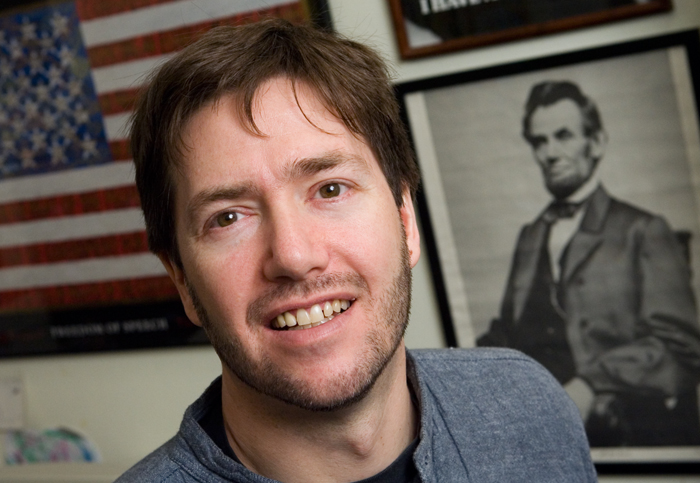After the Agora: Marquee Lecture with Dr. Stephen Hartnett
On Monday, February 12, 2018, the Aggie Agora hosted a Marquee Lecture with Dr. Stephen Hartnett. Dr. Hartnett is a professor at the University of Colorado Denver and Immediate Past President of the National Communication Association. The title of the Marquee Lecture was “Trumpism, Amnesia, and the Politics of ‘New Fascism’ Rhetoric”. The speaker began […]

On Monday, February 12, 2018, the Aggie Agora hosted a Marquee Lecture with Dr. Stephen Hartnett. Dr. Hartnett is a professor at the University of Colorado Denver and Immediate Past President of the National Communication Association. The title of the Marquee Lecture was “Trumpism, Amnesia, and the Politics of ‘New Fascism’ Rhetoric”. The speaker began with a picture of a young woman holding a protest sign that read, “My grandfather fought the Nazis so I wouldn’t have to.” The subject matter for the evening was to determine whether or not the Trump presidency signifies a new wave of fascism, which is a common discussion amongst those who oppose his administration. The talk was organized into five different sections: the history of fascism, the age of catastrophes and the assault on truth, fascism as a political style, fascism as a state form, and a celebration of democracy. Before he began, Hartnett said to the audience, “We will survive Donald Trump. Take a deep breath. He is not the end of democracy.”
The historical section of the lecture began with references to speeches by Winston Churchill in 1945, the Truman Doctrine in 1946, and statements by George W. Bush in 2001 to portray the evolution of the term fascism. Hartnett stated that fascism can mean “everything and nothing.” Due to the convoluted nature of the word, he warned us against using sloppy political rhetoric. Hartnett reminded us there are differences between Nazism, Al-Qaeda, totalitarian regimes, and fascism. The deployment of the word fascism to describe all, he claimed, is dangerous.
Next, Hartnett discussed what he called the age of catastrophe in Post-World War I Europe. Hartnett described this time period as the age of catastrophe because every known government in Western Europe was in ashes, there was mass poverty and hunger, and there were huge populations of refugees. This period of catastrophe lead to disdain for the “running sore” of liberalism. Fascist rhetoric was deployed to “smash liberalism’s commitments to prudence, evidence, civility, and the other markers of the Old Order’s failed manners.” This time of crisis lead to an assault on truth by fascist regimes and individuals. In such moments of crisis, complex truths are viewed as the enemy and they are solved by simple and clear lies. Hartnett underscored how Trump has used this fascist style of rhetoric by reminding the audience of when he falsely claimed that former President Obama was financing ISIS.
Then, Hartnett described fascism as a political style through seven indicators. These indicators included: belief in national decline, betrayal of elites, heroic patriarchy, nostalgic greatness, loyalty to one’s party above law and expertise, xenophobic provincialism, and specious nomenclature. Hartnett compared Trump’s political style with these indicators:
Fascists believe the world is crumbling around them, and Hartnett argued the driving metaphor of Trump’s inaugural speech was “American carnage.” The betrayal of elites was imperative for Hitler, but Harnett stated the betrayal of the elites has not happened in Trump’s cabinet and administration. Heroic patriarchy was a strong component in the depiction of Mussolini, and though Hartnett believes there is much sexist speech in the current administration he argued there is an absence of a heroic patriarchal figure. The fascist movement in Italy harkened back to the greatness of the Roman Empire, and Hartnett stated Trump’s attempt at this nostalgia was his “Make America Great Again” campaign. Hartnett also argued the notion of party above the law and expertise is also present the Trump administration, as is the replacement of experts in the civil service with party members. Hartnett finds this replacement phenomena the most frightening of all. Hartnett also stated xenophobia is present in Trump’s administration in a way similar to that of the Nazi regime. Finally, specious nomenclature is essentially calling people bad names. Hitler turned names into weapons and to create otherness, and Hartnett stated that Trump has done the same. Trump has coined the names Crooked Hilary, Lyin’ Ted, Leakin’ Comey, and Pocahontas, to name a few.
Hartnett is more than willing to admit that Trump certainly speaks like a fascist, but states that he does not govern like one. To Hartnett, the fascist state is where Trump comparisons fall apart. In fascism, the state is above all. However, in the U.S., we are seeing the shift to a minimalist state. Trump’s appointments are destroying the state, Hartnett says, not fashioning a total state.
To conclude, Hartnett told the audience to “trust the process” of U.S. democracy. He said democracy has been tested before, and he believes it will withstand the test of Donald Trump. Democracy is a corrective system and those corrections are seen at the polls, Hartnett stated. Due to his belief that journalism is stronger than ever, American universities are the envy of the world, and that America’s civil religion trumps the destructive fringe elements, Hartnett is optimistic. His call to action for the audience is to not just observe the process of democracy, but to actively participate in it.
